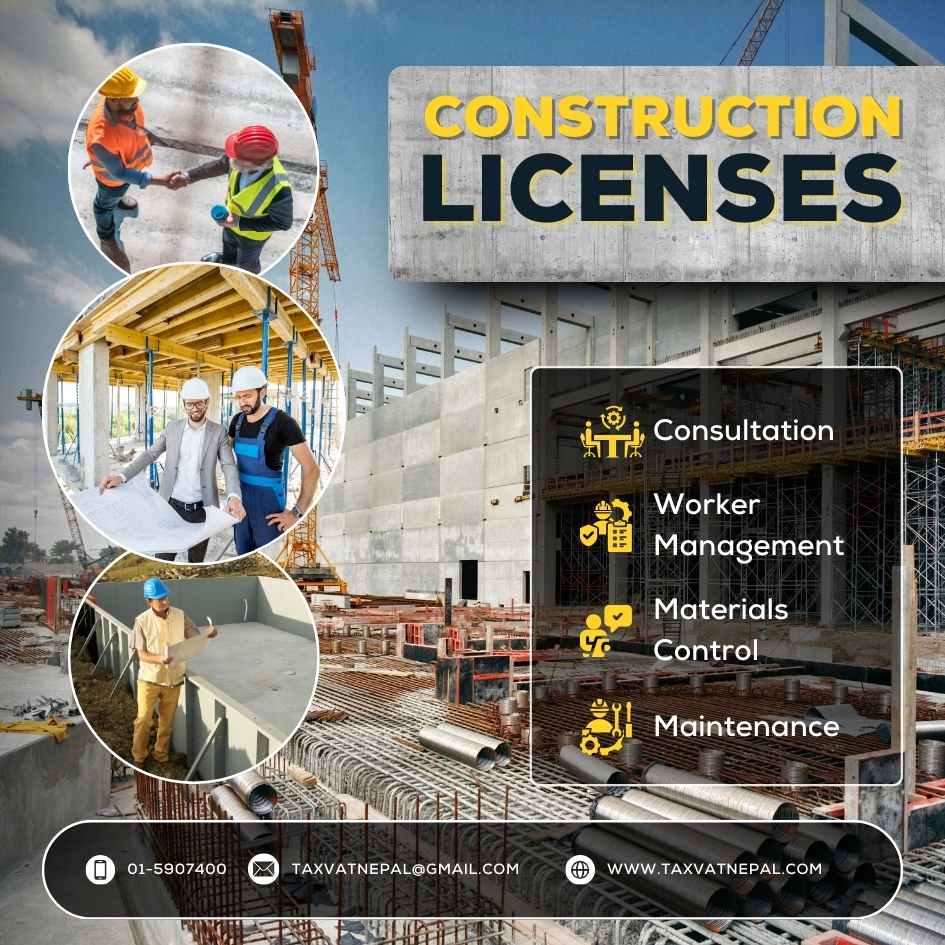
Step-by-Step Guide to Obtaining a D Class Construction License in Nepal
Nepal’s D Class construction license allows companies to undertake small-scale construction projects. This guide provides a detailed step-by-step process to help you navigate the registration process smoothly.
1. Company Registration
Step 1: Register Your Company
- Visit the Office of the Company Registrar (OCR): You can find the office in Kathmandu or use the online registration portal (http://ocr.gov.np).
- Submit Required Documents:
- Memorandum and Articles of Association (MOA/AOA)
- Shareholders’ agreement (if applicable)
- Citizenship certificates of shareholders
- Application form and registration fee
- Obtain the Company Registration Certificate: The OCR will issue the certificate once the documents are verified. Consequently, it is important to ensure all records are accurate and complete before submission. Additionally, the verification process may take some time, so it is advisable to check the status regularly. Once verified, the OCR will promptly issue the certificate, thus finalizing the process.
Step 2: Obtain PAN and VAT Registration
- Visit the Inland Revenue Department (IRD) or its regional offices.
- Submit Application:
- Company registration certificate
- MOA/AOA
- Proof of office address
- Passport-sized photos of directors
- Receive PAN Certificate: The IRD will issue a PAN certificate and, if applicable, a VAT registration certificate.
2. Prepare Required Documents for D Class License Application
Step 3: Gather Necessary Documentation
- Application Form: Obtain the D Class construction license application form from the local municipalities or Department of Urban Development and Building Construction (DUDBC).
- Company Documents:
- Company registration certificate
- PAN certificate
- Tax clearance certificate if required
- Technical Documents:
- Proof of technical qualifications of key personnel, such as engineers and architects, is crucial. For instance, certifications and licenses must be provided to verify their expertise.
- List of equipment and machinery owned by the company
- Financial Documents:
- Recent financial statements
- Bank guarantee or proof of capital
3. Submit Application
Step 4: Submit the Application to Local Municipalities
- Complete the Application Form: Fill out the form accurately with all necessary details.
- Attach Required Documents: Ensure all required documents are attached to the application form.
- Pay the Application Fee: Pay the Local municipality office’s prescribed fee.
4. Review and Inspection
Step 5: Application Review
- Initial Review: The local municipalities will review the application and documents to ensure they are complete.
- Field Inspection: A technical team from Local Municipalities may visit the company’s office and inspect the listed equipment and machinery.

5. License Issuance
Step 6: Approval and License Issuance
- Technical Evaluation: The Local Municipalities’s evaluation committee will assess the company’s technical capability and financial stability.
- Issuance of D Class License: If the evaluation is satisfactory, the Local Municipalities will issue the D Class construction license.
6. Post-Issuance Compliance
Step 7: Annual Renewal
- Submit Renewal Application: Every year, submit a renewal application with updated financial statements, tax clearance certificates, and other relevant documents.
- Pay Renewal Fee: Pay the annual renewal fee to maintain the validity of the license.
7. Key Considerations and Tips
- Stay Informed: Regularly check for updates in regulations and requirements from Local Municipalities.
- Maintain Records: Keep meticulous records of all transactions, technical qualifications, and equipment details.
- Hire Qualified Personnel: Ensure your team includes qualified engineers, architects, and other technical staff to meet Local Municipalities standards.
- Engage with Professionals: To streamline the process, consider consulting with legal and business advisors who specialize in the construction industry.
Conclusion
Obtaining a D Class construction license in Nepal requires careful preparation, accurate documentation, and compliance with regulatory standards. By following this step-by-step guide, you can navigate the process more efficiently and position your company for success in the construction industry.
FAQs: D Class Construction License Registration Process in Nepal
1. What is a D Class Construction License?
A D Class construction license in Nepal allows a company to undertake small-scale construction projects, typically involving minor works that do not require extensive resources or large financial investments.
2. Who issues the D Class Construction License in Nepal?
Local Municipalities are the primary authority responsible for issuing D Class construction licenses in Nepal.
3. What are the eligibility criteria for obtaining a D Class Construction License?
To be eligible for a D Class construction license, a company must:
- Be legally registered with the Office of the Company Registrar.
- Have technical staff with relevant qualifications and experience.
- Possess the necessary equipment and machinery for small-scale construction projects.
- Demonstrate financial capability through recent financial statements.
4. What documents are required to apply for a D Class Construction License?
The required documents include:
- Company registration certificate
- PAN certificate
- Tax clearance certificate
- Proof of technical qualifications of key personnel
- List of equipment and machinery
- Recent financial statements
- Completed application form
5. How do I apply for a D Class Construction License?
The application process involves:
- Registering your company and obtaining a PAN certificate.
- Gathering the necessary documents.
- Submitting the application form and documents to the Local Municipalities.
- Paying the application fee.
- Undergoing an inspection and review process by the Local Municipalities.
6. Where can I obtain the application form for a D Class Construction License?
The application form can be obtained from the Local Municipalities.
7. What is the cost of obtaining a D Class Construction License?
The cost includes the application fee, which varies and can be confirmed directly from the DUDBC or its official website. Additional costs may involve documentation preparation and any consultancy fees.
8. How long does processing a D Class Construction License application take?
The processing time can vary; however, it typically takes several weeks to a few months. This duration depends on the completeness of the application and the efficiency of the Local Municipalities. Consequently, ensuring that all required documents are accurate and complete can expedite the process. Additionally, contacting the relevant municipal offices may help address any potential issues promptly.
9. How long is the D Class Construction License valid?
The D Class construction license is typically valid for one year and must be renewed annually between Shrwan and Ashoj with regular fees.
10. What is the process for renewing a D Class Construction License?
To renew the license:
- Submit a renewal application form to the Local Municipalities.
- Provide updated financial statements and a tax clearance certificate.
- Pay the renewal fee.
11. What happens if my application is rejected?
If your application is rejected, the Local Municipalities will provide reasons for the rejection. You can address the issues highlighted, make the necessary corrections, and reapply.
12. Can foreign companies apply for a D Class Construction License in Nepal?
Foreign companies can apply; however, they must comply with all local regulations, including company registration and tax requirements. Additionally, they need to ensure that they meet any industry-specific guidelines. Moreover, understanding and adhering to local labor laws is crucial for smooth operations. Therefore, thorough research and preparation are essential for foreign companies to successfully navigate the application process.
13. Are there any specific technical requirements for the key personnel?
Yes, key personnel, such as engineers, architects, and project managers, must have relevant qualifications and experience in the construction industry. For instance, engineers should hold appropriate certifications and licenses. Similarly, architects need to demonstrate their expertise through professional degrees and accreditation. Additionally, project managers should possess substantial experience in handling construction projects. Therefore, verifying the credentials and backgrounds of these key personnel is essential for the successful execution of construction projects.
14. Is it mandatory to have specific equipment and machinery for a D Class Construction License?
Yes, the company must possess the necessary equipment and machinery required for small-scale construction projects, and this should be documented in the application.
15. Where can I get more information and assistance for the application process?
For more information and assistance, you can visit the Local Municipalities’s official website, contact their offices directly, or seek help from legal and business consultants specializing in construction licensing in Nepal.
By understanding these FAQs, applicants can better prepare for the D Class construction license registration process, ensuring they meet all requirements and streamline their application.
